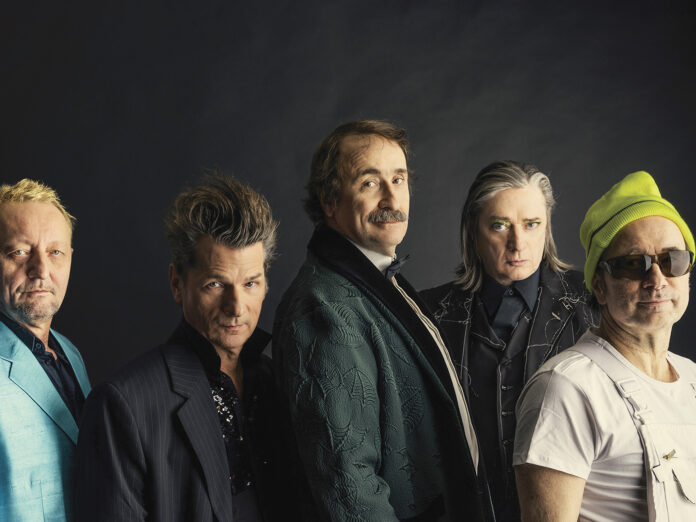In their own peculiar way, Einstürzende Neubauten have always been ruthlessly efficient. In their early days, they smelted completely new music from the ruins of West Berlin, scavenging everyday and industrial objects due to the necessity of poverty, to transmute, alchemically, into musical manna. In 2023, that practicality manifested differently. Ready to record a new album, but with limited time on the schedule, the group decided to use their ‘rampen’ – in-concert improvisations – as base material for the 15 songs that constitute Rampen (apm: alien pop music).
In their own peculiar way, Einstürzende Neubauten have always been ruthlessly efficient. In their early days, they smelted completely new music from the ruins of West Berlin, scavenging everyday and industrial objects due to the necessity of poverty, to transmute, alchemically, into musical manna. In 2023, that practicality manifested differently. Ready to record a new album, but with limited time on the schedule, the group decided to use their ‘rampen’ – in-concert improvisations – as base material for the 15 songs that constitute Rampen (apm: alien pop music).
JONI MITCHELL IS ON THE COVER OF THE NEW UNCUT – ORDER YOUR COPY HERE!
It’s also an album that’s particularly rich with the much under-recognised Neubauten sense of humour. In recent interviews, Neubauten’s leader Blixa Bargeld has made knowing parallels with The Beatles, from the suggestion that in another solar system, Neubauten are as famous as The Beatles, to the way Rampen (apm: alien pop music) reflects The White Album in its one-colour artwork and double-album presentation. (Apparently, member NU Unruh suggested the album should be called Gelb (Yellow).) The subtitle of the final title is the clincher, though, with Rampen offering the listener a kind of pop music for the minority.
If anything, it’s curious that it’s taken Neubauten so long to formally recognise an umbilical to pop that’s existed since their 1980s covers of Nancy Sinatra and Lee Hazlewood’s “Sand” and Serge Gainsbourg and Jane Birkin’s “Je t’aime”. Their idea of pop may be like nobody else’s, but it’s hard to deny that Bargeld and the group have a way with a catchy mantra: Bargeld’s already noted that the sing-song melody of “Everything Will Be Fine” has caught the ear of the group’s fanbase, ringing out after they’d left the stage at a performance for Patreon supporters earlier this year.
Rampen is the last album Einstürzende Neubauten have recorded as part of their long-running Patreon campaign. With the campaign acting as a slow-release eject from the music industry, there’s something galvanising about the way they’ve signed off with their best album in decades. This is not to slight previous albums like Perpetuum Mobile or Alles In Allem, but the group are on particularly excellent form. And if the aesthetic coordinates aren’t exactly surprising – a combination of krautrock, the anarchist polit-rock of Ton Steine Scherben, and art song – they’re deployed both stylishly and fiercely.
Indeed, Bargeld acknowledges the parallels between the structure of Rampen and classic krautrock double albums, such as Can’s Tago Mago, right down to the expansive, psychedelic third side, which on Rampen consists of “The Pit of Language”, “Planet Umbra”, and “Tarred & Feathered”. The sound here is mercurial, hypnotic, the eight minutes and two chords of “Planet Umbra” pulsing across a febrile, sensuous landscape, Unruh playing water across the song to reconcile the dryness of the planet.
“The Pit Of Language” and “Tarred & Feathered” are sister songs, amorphous things that have Bargeld circling and exploring one of the album’s key themes. The various themes that crop up through the album – gender, identity, language – feel immanent in the music, too; everything here is of a piece, the music ‘speaks’, its identity slips and slides between registers, between forms. Nowhere is this more obvious than the closing “Trilobiten” and “Gesundbrunnen”, which skirl with detail while Bargeld analogises the pre-gender trilobite fossil – gifted to him by an event organiser – with “small diamonds from grey prehistory”, before “me/you” is “undivided”.
In “Gesundbrunnen”, this blossoms into a questioning of essentialist thinking, where “we rehearse what is new/Fully beyond biology/As diluvian beings/Multitudinous beings not determined”. It’s a world of possibility that Bargeld has gestured towards before, with the “nonbinary I” of Alles In Allem’s “Seven Screws”, but here he’s seeing the beautiful, multiple and utopian possibilities of life beyond the binary: “Where once there had been no door/I will now open up for you”. Bargeld himself says, “I’m trying to put a utopian moment in every song. Apart from the utopian as a place, there’s the ucorporean, the utopian body, the changes of the body, the freedom of changing the body.”
Rampen is full of such utopian moments, even as songs like “Everything Will Be Fine” acknowledge, with no small amount of cynicism, the geopolitical precipice we collectively find ourselves hovering over, with right-wing politics and fascism on the global ascent. There are limits, of course, to what one band can achieve. But in both the fecund scent of its music, constructed from an instrumental palette that ranges from the elegant to the punked and jerry-rigged, and the liberatory politic of Bargeld’s lyrics, Rampen feels like something springing up, fully formed, and ready for ideological battle.
When you purchase through links on our site, we may earn an affiliate commission. Here’s how it works.



